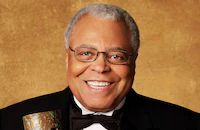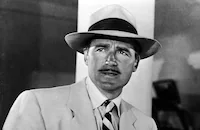The Man
Brief Synopsis
Cast & Crew
Joseph Sargent
James Earl Jones
Martin Balsam
Burgess Meredith
Lew Ayres
William Windom
Photos & Videos
Film Details
Technical Specs

Synopsis
In Washington, D.C., Secretary of State Arthur Eaton receives the news that the President and Speaker of the House have been killed in a building collapse in Germany. The Cabinet immediately gathers and the Chief Justice is brought in to swear in Vice President Noah Calvin, but Calvin, who is mortally ill from a recent stroke, refuses to accept the post. Although the Cabinet members turn to Eaton as the next obvious candidate, he reminds them that, due to a recently amended order of succession, the next in line for the presidency is the President Pro Tempore of the Senate, African American Douglass Dilman. Awoken in the middle of the night with the news, Dilman enters the White House with trembling hands, knowing that as the first black president, his appointment will prove divisive to the country. His daughter Wanda, a militant graduate student, chastises her professor father for his past ineffectiveness and urges him to stand up for his people. At his home, meanwhile, Eaton is berated by his wife Kay, who desperately desires his presidency and blames him for not pushing hard enough for it, calling him "kingmaker to a jigaboo." The next day, as Dilman peruses the Lincoln Monument, Eaton and advisor Jim Talley plan for Dilman's entry into the Oval Office, assuming they will control the neophyte closely. When Dilman enters the office, he contemplates the portraits of those who have gone before him. Soon, activity buzzes around him, but Dilman feels irrelevant and overlooked by Eaton's careful management and the other advisors' disregard. At the end of the day, the subject is broached of the new minorities rehabilitation bill, which racist Southern Senator Watson disdains. Although Dilman voices his approval of the bill, Watson warns him he should stay away from any insinuation of racial preference. Dilman quietly demurs, prompting Watson to announce that Dilman's appointment as President Pro Tempore was a mere gesture to stem militant uprisings and that they expect him to be discreet and uncontroversial as president. The next day, Talley and Press Secretary Steve Helms discuss the attempted assassination of the South African Republic Defense Minister by a black American citizen who was in Africa at the time. Although they try to shield Dilman from the news, he hears of it and relates his frustration at being shut out. His first cabinet meeting is called for the next day, and is interrupted by a previously scheduled meeting of black congressmen. Dilman insists on seeing the congressmen, who tell him that Watson is supporting a bill proposing that the President be prohibited from firing cabinet members without the approval of Congress, a move designed to rob Dilman of power. Dilman addresses his cabinet, and when Eaton assures him that the bill will not come up for a vote while he is in office, Dilman storms out. Hours later he heads his first press conference, consulting Eaton's copious notes for responses to the reporters' questions. However, when Webson, a reporter from the Negro Press , demands that Dilman provide unscripted comments to his questions about the South African assassination attempt, Dilman announces that he condemns the South African government's militaristic policies and believes it would deny a fair trial to a black citizen. Afterward, Talley questions how Dilman found the courage to defy Eaton and offend an ally, and the President responds that he finally has realized that he is just as worthy as his advisors. At a nearby bar, as Watson conveys his fears to Eaton that Dilman may gain popularity and seek election at the upcoming Democratic convention, news comes that Dartmouth student Robert Wheeler has been named by South Africa as the shooter. Knowing that Wheeler will return to America and attempt to come to trial there rather than being extradited to South Africa, where he will surely be indicted, Watson suggests that they let Dilman "hang himself" by making the difficult decisions about Wheeler's treatment. In the ensuing days, Dilman grows increasingly more commanding. One day, his friend, Reverend Otis Waldren, brings in Wheeler, who has just arrived in America. Wheeler insists that he was in Burundi during the assassination attempt and is being targeted by the racist government for past activism. Dilman arranges protective custody and, after verifying Wheeler's story, proclaims him innocent. South Africa threatens to break off diplomatic relations, and after a furious Eaton asks Dilman to apologize, Talley informs Dilman that he may be able to win the party nomination, but only if he sidesteps controversy. That night, they all attend a dinner at which a drunken Kay calls Dilman an "interim caretaker more than President," to which Wanda responds with icy anger. Meanwhile, the white supremacist South African ambassador shows Watson secret footage of Wheeler bombing the Defense Minister, who has just died of his wounds. Armed with this irrefutable proof of Wheeler's guilt, Watson slyly informs the press of Dilman's mistake. Days later Dilman calls in Watson and, after receiving more evidence of Wheeler's plot, demands to know why he was not informed sooner. After Watson leaves, Dilman wonders aloud if he wanted Wheeler to be innocent because he is black. At his inquest, Wheeler invokes the Fifth Amendment and Watson uses the forum to further his political aims. Just two weeks before the Democratic convention, the country is violently divided over Wheeler's treatment. Dilman calls the young man into his office and denounces his underhandedness, and in return Wheeler calls the President a "house nigger." Dilman responds that if he kills whoever displeases him, he will be indistinguishable from his enemies. Wanda sees Wheeler leaving and, realizing her father will not support the young man, condemns Dilman as dishonorable and scared. While protestors gather to support Wheeler, the newspapers announce voter support for Eaton as the next president. Even the black congressmen urge Dilman to shed his liabilities by asking another arm of the government to deal with Wheeler, but Dilman insists that he cannot back away from the moral issues at hand. On the day of the convention, Dilman announces that he will extradite Wheeler, explaining that in a time of escalating violence, the cycle must be curtailed. He quotes from Genesis: "Behold the dreamer. Come now therefore and let us slay him, and we shall see what has become of his dream." Entering the convention hall, a reporter asks Dilman if his strong words indicate that he plans to give up the nomination, but Dilman responds that he will fight even harder for it. In the crowd, Wanda is pleased and proud of her father's strength. Dilman takes the podium to the sounds of the crowd's passionate applause.

Director
Joseph Sargent
Cast

James Earl Jones

Martin Balsam

Burgess Meredith

Lew Ayres

William Windom

Barbara Rush
Georg Stanford Brown
Janet Maclachlan
Martin Brooks
Simon Scott

Patric Knowles
Bob Doqui
Anne Seymour
Edward Faulkner
Gilbert Green
Lew Brown
Philip Bourneuf
Reginald Fenderson
Elizabeth Ross
Barry Russo
Gary Walberg
Ted Hartley
Charles Lampkin
Lawrence Cook
Vince Howard
Leonard Stone
Howard K. Smith
Bill Lawrence

Jack Benny
Crew
James I. Berkey
Hoyt Bowers
Guy Carawan
John Casey
Jack Flesher
Jerry Goldsmith
Michael Green
Frank Hamilton
Zilphia Horten
James G. Hulsey
John Isaacs
Lily La Cava
Harold Lewis
Neil T. Maffeo
Lynn Masters
George Nicholson
Lee Rich
Edward C. Rosson
James Sanderson
Kent Schafer
Sir Walter Scott
Pete Seeger
Christopher Seitz
Ygnacio Sepulveda
Rod Serling
Robert Sidell
Lowell Thomas

Photo Collections
Film Details
Technical Specs

Quotes
Trivia
Originally made for television, but released theatrically first.
Notes
The opening credits read: "James Earl Jones in Irving Wallace's The Man." Edit International, Ltd.'s onscreen credit reads: "Sound effects and music editing." The closing cast credits end with the phrase: "Our special thanks to Howard K. Smith, Bill Lawrence and Jack Benny." The final scenes include newsreel footage of the 1968 Democratic National Convention.
Wallace's novel The Man was published in 1964. A bestseller, it won Paperback of the Year and sold over 5 million copies upon its release. According to the film's press materials, Wallace was allowed unprecedented access to President John F. Kennedy's White House to research his book. After Wallace wrote about 100 pages of the novel, Kennedy was assassinated, prompting the author to rewrite several passages to bring the death into perspective. Much of the long novel was edited out of the screen version, including story lines about "Douglass Dillman's" attempted impeachment, an assassination attempt on his life and a child of his "passing" as white.
The novel underwent a complicated transition from page to screen. As early as December 1963, Variety reported that reprint rights had already been purchased at a record price and "major film companies" were considering buying the film rights. At that time, the news item noted that filmmakers were concerned about the future picture's reception in Southern states. In March 1965, Daily Variety stated that Joint Venture Co., headed by Sammy Davis, Jr., Milton Greene and Irving Stein, had purchased the film rights to the novel and planned to shoot in early 1966 with Sidney Poitier as the star. A Hollywood Reporter news item in March 1965 noted that Davis would finance and executive-produce the film, while Greene would serve as the producer. Between 1966 and 1969, as noted in various trade publication news items, the novel's film rights changed hands several times. After NBC-TV considered adapting the book into a television special with Poitier as a star, as reported in Hollywood Reporter in September 1966, Promel Productions, Inc. bought the rights, followed by actor Eddie Fisher.
Argo International purchased the book rights in May 1968 and hired William Attaway to write the script. Jayjen Productions announced in an June 11, 1969 Daily Variety news item that it planned to produce a film version, to star Brock Peters and be written by Reginald Rose. However, Argo president Jack Lamont challenged Jayjen's statement in a 27 June Daily Variety article and stated that Arthur Hiller was set to direct Argo's version. Hollywood Reporter's "Rambling Reporter" then noted in July 1969 that Jayjen's president, Monroe Sachson, had optioned the property but Argo had a priority right to the screenplay written while they owned the rights. In July 1969, however, Daily Variety reported that Wallace denied ever having had any dealings with Sachson. That article named Joy Garrison as co-writer of Argo's screenplay, along with Attaway.
Lorimar Productions produced The Man for ABC-TV in late 1971, intending it to be broadcast on television as a planned two-part Movie of the Week. However, n March 1972, as noted in Daily Variety, Paramount decided to release the film theatrically. Although a May 1972 Publishers Weekly article stated that the film was being moved from television to movie theaters because of the excellence of the adaptation, a modern source related that many television sponsors had shied away from the film's controversial content.
As noted in Filmfacts, some scenes were shot on location in Washington, D.C. and Los Angeles. A modern source adds Curt Conway to the cast. In November 1972, as noted in Daily Variety, Mrs. Alex Presta sued Paramount Pictures for $65,000 for invasion of privacy because scenes of her at the 1968 Democratic National Convention, included in the film without her permission, May have made her appear "antiblack." The disposition of the suit has not been determined.

Miscellaneous Notes
Released in United States 1972
Released in United States 1972











